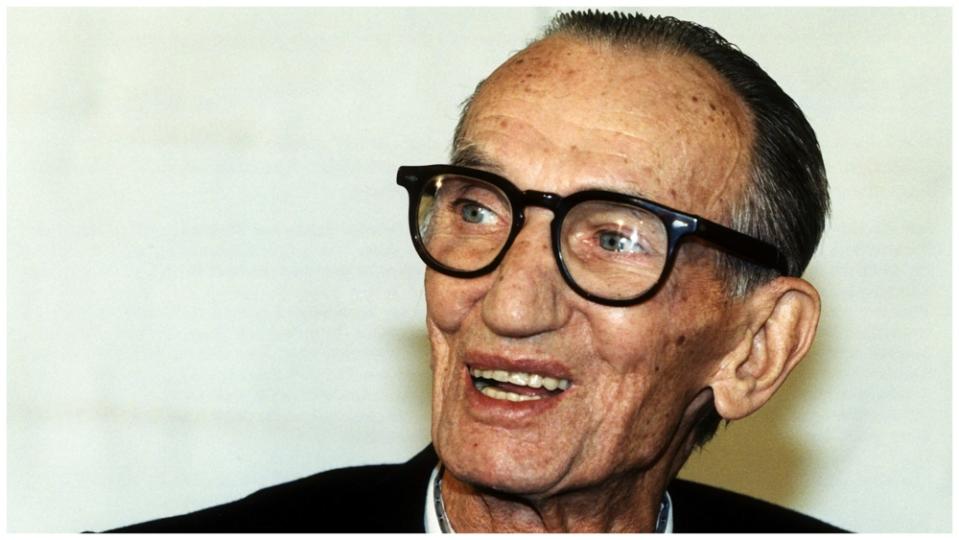Italian Director Andrea Di Stefano, at Tribeca With ‘Last Night of Amore,’ Developing Feature Film on Holocaust Whistleblower Jan Karski (EXCLUSIVE)

Italian actor-turned-director Andrea Di Stefano, whose sleek cop thriller “Last Night of Amore” just had its U.S. premiere at the Tribeca Film Festival, is in advanced stages of development on “Karski” a feature about Jan Karski, the World War II Polish resistance fighter who risked his life to blow the whistle on the Holocaust.
Di Stefano’s high-profile project, which is titled “Karski,” is being developed by New York City-based production company Phiphen Pictures, the indie founded by Molly Conners most recently behind Netflix’s “Like Father” and “It’s Bruno!,” the director said. Italy’s expanding Indiana Production, which shepherded “Amore,” is also on board.
More from Variety
Karski in 1942, defying great danger, twice infiltrated Warsaw’s Jewish Ghetto to witness its horrors and managed to give first-hand accounts of the Holocaust from the Warsaw Ghetto to the Allies, including U.S. President Franklin D. Roosevelt in 1943. But his alarm cries fell on deaf ears.
After the war, Karski became a professor at Georgetown University. Until he gave testimony for French filmmaker Claude Lanzmann’s seminal Holocaust documentary “Shoah” in 1978, he had rarely spoken — even to colleagues at Georgetown — about what he had done.
“He was a history professor at Georgetown in 1986 when Lanzmann’s doc played on PBS in the U.S.,” Di Stefano said. “The next morning he goes to Georgetown, that’s when the movie starts,” he added. Di Stefano described his “Karski” film as having an atmosphere somewhat similar to “Dead Poet’s Society.”
“This professor, after the part with his interview airs on PBS, finds his students waiting for him at the auditorium. They had no idea that he was a World War II hero,” Di Stefano went on. Then in the screenplay, written by Di Stefano, Karski talks to his students and tells them the story of how at 20 he joined the Polish underground after the Nazi invasion of Poland.
Di Stefano said the plan is to shoot the film in various languages, Polish, English, and German and to have Karski payed by a U.S. star.
Aside from the Lanzmann doc, the story of Jan Karski has previously been brought to the screen in the 2015 partially animated documentary project “Karski & The Lords of Humanity” by Polish-born director Slawomir Grünberg; in Lanzmann’s standalone 2010 doc “The Karski Report”; and more recently in the PBS film “Remember This: The Lesson of Jan Karsk” based on the original stage production by the same title featuring a tour-de-force solo performance by David Strathairn as Karski.

Di Stefano studied acting at New York’s Actors Studio in the early 1990s and subsequently helmed well-received U.S. indie thrillers “Escobar: Paradise Lost,” with Benicio del Toro, and “The Informer,” before returning to Italy to shoot “Last Night of Amore” which stars Pierfrancesco Favino (“The Traitor,” “Nostalgia”) as a police lieutenant named Franco Amore.
He is called on the night before retirement to investigate a crime scene where his best friend and long-time partner Dino has been killed during a diamond heist. Complications ensue and we learn how his love for his wife Viviana, played by Linda Caridi (“The Ties”), will help Amore survive the longest and most challenging night of his existence.
Since launching positively earlier this year from Berlin “Amore” has scored a handsome €3.2 million ($3.4 million) at the Italian box-office where it was released in March and also just opened well in France.
“I think that Quentin Tarantino has done a lot to rediscover Italian ‘poliziottesco’ (cop) films like those made by Fernando Di Leo,” Di Stefano said, commenting on one of his references for “Amore.”
“Those films had a vitality similar to the films that William Friedkin made in New York like ‘French Connection’,” he added, noting that “They were street movies that Americans have stopped making, maybe because it’s difficult to shoot in the street.”
Instead, in making “Amore” Di Stefano said he “Really wanted to bring the camera on the street. I wanted the audience to smell the city. I wanted to make my life difficult: how can we shoot the highway without using VFX? How can I do an aerial shot of Milan without using the drone? Let’s try using a helicopter,” he said. The film’s fantastic four-minute opening shot stands as a testament to his approach.
“Last Night of Amore” was co-produced by Italy’s Vision Distribution, Indiana Production, Memo Films and Adler Entertainment and is being co-distributed globally by Universal Pictures Intl., Focus Features, and Italy’s Vision Distribution which have worldwide distribution rights. The film has not yet been picked up for U.S. distribution.
Best of Variety
Sign up for Variety’s Newsletter. For the latest news, follow us on Facebook, Twitter, and Instagram.

